- Make It Yourself Lavender Heart-Shaped Bath Bombs!
- 20 Things You Never Knew About “Down There”
- 12 Best Foods For Those Suffering From Arthritis Pain
- 12 Personal Hygiene Mistakes Almost Everyone Makes (Mom Never Told You About #4!)
- 15 Medicinal Plants And Herbs From The Cherokee People
- 12 Mind-Blowing Benefits Of Drinking Coconut Water During Pregnancy
- 12 Outstanding Winter Foods That Won’t Fatten You Up Like A Christmas Turkey
Best Natural Remedies Ever to Help Fight Pneumonia
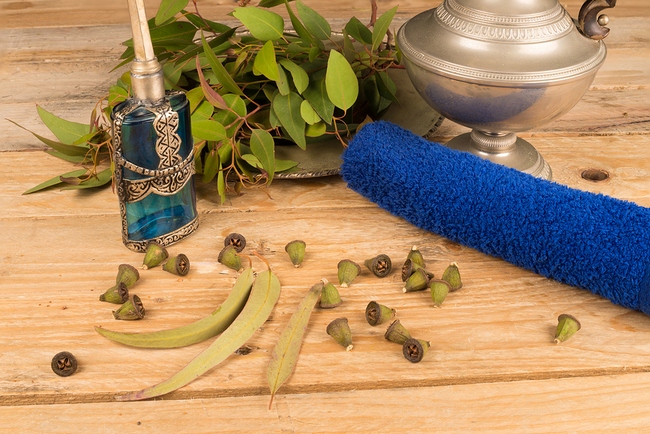
Photo credit: bigstock.com
If you have ever had pneumonia, you know how painful a simple cough can become. You wheeze and feel as if you can’t catch your breath. This inflammation of the lungs can be viral, fungal, bacterial, or occasionally even a parasitic infection. It is a serious health issue, because the heart and other organs in the body might not get the oxygen they need. In fact, if not properly treated, it can even prove to be fatal, especially to the young, elderly, and those with chronic diseases or compromised immune systems. Although there are plenty of natural remedies that will help ease the symptoms and shorten the duration of the infection, most people will need to see a doctor.
We want to emphasize that if you think you or your family member has pneumonia, it is important that you see a doctor right away. The following natural remedies will help to fight pneumonia by strengthening the immune system, and will make the subject more comfortable, and can hasten the recovery time, but a doctor’s intervention is very important.
Now, keep reading for the best natural remedies that can assist you in recovering from pneumonia and help to make you feel more comfortable as well as improve your own natural immunity to fight off the infection.
1. Eucalyptus Oil/Tea Tree Oil Steam
Tea tree oil and eucalyptus oil both have antibacterial and antimicrobial compounds. These kill the bacteria in the lungs which cause pneumonia.
The best way to utilize these oils is through steam. Breathing in steam will help to relieve the congestion, help you cough up mucus, and drive the antibacterial oils deep into the lungs. You can also add these oils to a base oil, such as jojoba or coconut oil, and rub it on the chest to help loosen congestion as well. Add three or four drops of each oil in a pan of very hot water and breathe in the steam deeply. You can drape a towel over your head to keep the steam concentrated on your face. Keep breathing in the steam until you stop smelling the eucalyptus oil. Repeat this at least once or twice a day.
If you wish to use it as a chest rub, add about 10 drops of both eucalyptus oil and tea tree oil into each tablespoon of carrier oil (such as almond, olive, coconut, or jojoba oil) and rub this mixture into the chest.
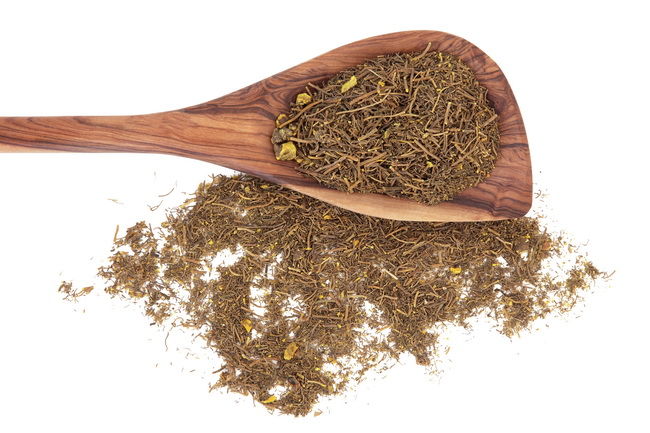
Photo credit: bigstock.com
2. Goldenseal
This herb is well known for its anti-inflammatory, antibiotic, anti-bacterial, and astringent compounds. Goldenseal helps to soothe irritated muscles and, when taken at the first sign of a serious chest congestion, can even help to stop any further development of the problem.
Goldenseal has been used by the Native American Indians for hundreds of years to help relieve congestion and fight fevers. It also has powerful immune improving compounds. This herb is so popular that it has been harvested almost to extinction, so if you find you have trouble finding this herb, you can also use Oregon Graperoot, as it has almost the same properties.
To use this herb, take two tablespoons of dried goldenseal and about 1.5 cups of water and place it in a saucepan. Allow to simmer gently (don’t boil) for about 10 to 15 minutes. Strain out the herbs and drink this tea at least 3 to 5 times a day.
NOTE: Pregnant women should not consume goldenseal, as it can stimulate contractions. Also, if you have heart problems, or are taking any type of prescription medication, always talk to your doctor first before you consume goldenseal.
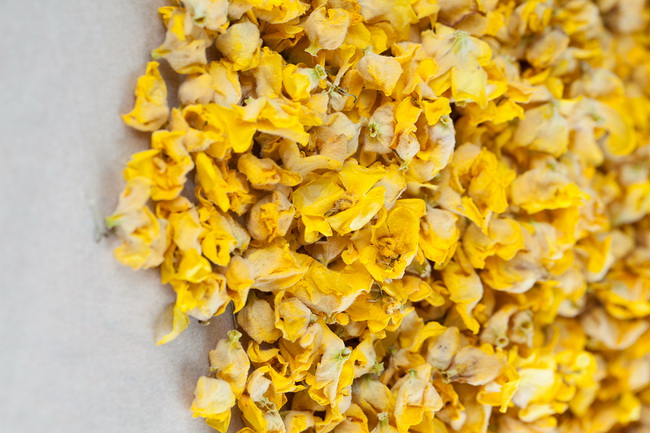
Photo credit: bigstock.com
3. Mullein Infusion
Mullein grows wild throughout the meadows of Asia, Europe, and North America, so unlike goldenseal, you won’t have any trouble finding this herb. In fact, it is so plentiful that once you are sure you can identify it, you can probably find it just about anywhere, even just growing along the side of the road. This herb has been used traditionally to treat respiratory diseases as it has powerful expectorant compounds, which means this herb is super at relieving chest congestion.
Herbalists are known to recommend this herb for those suffering from pneumonia, asthma, and tuberculosis. Some studies show that mullein will kill viruses in test tubes. Make mullein tea by adding up to 2 teaspoons of dried flowers and leaves to a mug of boiling water. Turn off the flame and allow to steep for about 10 minutes, breathing in the steam as it cools, then drink the tea when it is cool enough to consume. An infusion made with mullein is perhaps the best way to use this herb to fight pneumonia.
SEE ALSO: Top 15 Most Powerful Medicinal Plants
To make an infusion, put one cup of dried mullein flowers and leaves in a mason jar. Fill the jar with boiling water almost to the top. Stir well, and then cover the jar tightly. Allow this mixture to steep overnight. In the morning, strain out the herbs and add two tablespoons of raw organic honey. Drink one to three cups of this infusion each day until your condition improves. Keep this infusion in the refrigerator after opening. It will keep in the refrigerator for about one week.
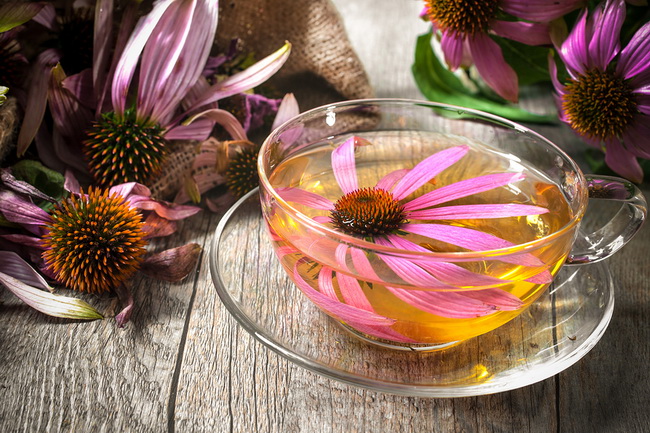
Photo credit: bigstock.com
4. Echinacea
You have probably heard about this herb and chances are good you have even consumed it in the past, as this is perhaps the most popular herbal cold and flu remedy in America. This beautifully flowering plant is native to North America and is well known for its immune boosting compounds. Echinacea stimulates a process in the body that causes immune cells to destroy infectious organisms in the body. Echinacea has mild antibacterial properties and is best used as soon as you identify the symptoms of pneumonia. This herb will be super helpful in helping your own immune system fight off this disease.
Echinacea tea can be purchases just about everywhere, or you can make your own super immune support tea by making the following mixture:
Take ½ teaspoon of each of the following dried herbs: lemon grass, spearmint or peppermint leaves, and Echinacea. Add the herbs to two cups of boiling water and add one tablespoon of raw organic honey. Pour the boiling water over the herbs and steep for about 10 minutes, breathing in the steam as it cools. Strain and add the honey. Drink this once or twice per day to help speed healing and recovery time.
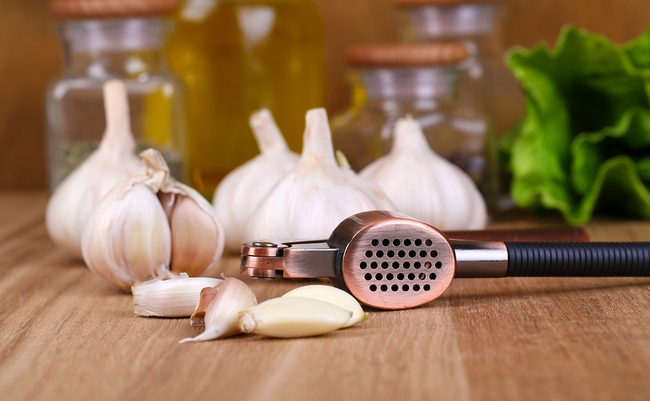
Photo credit: bigstock.com
5. Garlic
Without a doubt, garlic has a reputation as being a super food that has powerful healing properties. With its effective antimicrobial compounds, garlic can fight viruses, bacteria, fungi, even parasites. Garlic also improves the immune system. There are numerous ways you can use garlic to help you heal your pneumonia.
- Crush two or three cloves of garlic and swallow them every day.
- Crush two garlic cloves and mix in a tablespoon of raw, organic honey and lemon juice and drink this two or three times per day.
- Mash up a few garlic cloves into a paste and rub this on your chest, breathing in the fumes as much as possible.
- You can also grind up 8 or so cloves of garlic and mix it with about 10 drops of lavender essential oil. Rub this mixture on your chest twice per day and again, be sure to breathe deeply.
- Mix equal parts of garlic oil and olive oil and rub it on your feet morning and night. Cover your feet with socks so it won’t rub off or get on your carpet.
- Be sure to add plenty of fresh, organic garlic to your soups and vegetable dishes
- The following is very strong but it is also very effective: Take 5 or 6 cloves of garlic and a half of a medium onion. Chop these two together, and then add 2 tablespoons of raw, organic honey to the mix. Place these items in your blender with one cup of water and mix well. First thing in the morning, drink this onion/garlic/honey mixture. This tonic will open up your bronchial tubes, help to expel mucus, and help you to breathe all day long. Read more how use garlic medicinally in a proper way.
Remember that these remedies are meant to encourage healing and help to improve breathing while strengthening your own immune system to fight off this infection. If you should begin to feel worse or if your symptoms become more severe, do not hesitate to call a doctor or visit your nearest emergency room.
References:




























